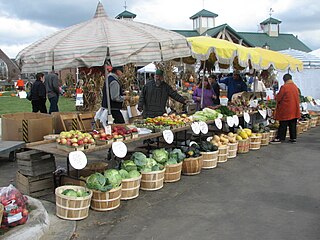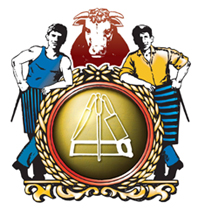Related Research Articles

In livestock agriculture and the meat industry, a slaughterhouse, also called an abattoir, is a facility where livestock animals are slaughtered to provide food. Slaughterhouses supply meat, which then becomes the responsibility of a meat-packing facility.

Quorn is a brand of meat substitute products, or the company that makes them. Quorn originated in the UK and is sold primarily in Europe, but is available in 14 countries. The brand is owned by parent company Monde Nissin.

A farmers' market is a physical retail marketplace intended to sell foods directly by farmers to consumers. Farmers' markets may be indoors or outdoors and typically consist of booths, tables or stands where farmers sell their produce, live animals and plants, and sometimes prepared foods and beverages. Farmers' markets exist in many countries worldwide and reflect the local culture and economy. The size of the market may be just a few stalls or it may be as large as several city blocks. Due to their nature, they tend to be less rigidly regulated than retail produce shops.

Food processing is the transformation of agricultural products into food, or of one form of food into other forms. Food processing takes many forms, from grinding grain into raw flour, home cooking, and complex industrial methods used in the making of convenience foods. Some food processing methods play important roles in reducing food waste and improving food preservation, thus reducing the total environmental impact of agriculture and improving food security.
Rendering is a process that converts waste animal tissue into stable, usable materials. Rendering can refer to any processing of animal products into more useful materials, or, more narrowly, to the rendering of whole animal fatty tissue into purified fats like lard or tallow. Rendering can be carried out on an industrial, farm, or kitchen scale. It can also be applied to non-animal products that are rendered down to pulp. The rendering process simultaneously dries the material and separates the fat from the bone and protein, yielding a fat commodity and a protein meal.

The Australasian Meat Industry Employees Union is an Australian trade union representing workers in the meat industry including in abattoirs, butchers, and smallgoods manufacturers.

The meat-packing industry handles the slaughtering, processing, packaging, and distribution of meat from animals such as cattle, pigs, sheep and other livestock. Poultry is generally not included. This greater part of the entire meat industry is primarily focused on producing meat for human consumption, but it also yields a variety of by-products including hides, dried blood, protein meals such as meat & bone meal, and, through the process of rendering, fats.

Pork ribs are a cut of pork popular in Western and Asian cuisines. The ribcage of a domestic pig, meat and bones together, is cut into usable pieces, prepared by smoking, grilling, or baking – usually with a sauce, often barbecue – and then served.

The North American Meat Processors Association (NAMP) was an industry group for meat processors, packers, and distributors. It was a nonprofit, membership-based group with significant presence in the U.S., Canada and the Caribbean.

The American Meat Institute (AMI) was the oldest and largest trade association representing the U.S. meat and poultry industry. In 2015, it was merged into the North American Meat Institute (NAMI).
The Canadian Meat Council is Canada's national trade association for the federally inspected meat packers and processors. It is an industry trade group associated with the meat packing industry. Federally inspected plants account for over 90% of all the meat processed in Canada.

The fishing industry in Scotland comprises a significant proportion of the United Kingdom fishing industry. A recent inquiry by the Royal Society of Edinburgh found fishing to be of much greater social, economic and cultural importance to Scotland than it is relative to the rest of the UK. Scotland has just 8.4 per cent of the UK population but lands at its ports over 60 per cent of the total catch in the UK.
Cargill Meat Solutions is a subsidiary of the Minneapolis-based multinational agribusiness giant Cargill Inc, that comprises Cargill's North American beef, turkey, food service and food distribution businesses. Cargill Meat Solutions' corporate office is located in Wichita, Kansas, United States. Jody Horner is the division's president.
The National Pig Association is the trade association for the pig industry in the UK.

Cakalang fufu is a cured and smoked skipjack tuna clipped on a bamboo frame, a Minahasan delicacy of North Sulawesi, Indonesia.

Devin Dreeshen is a Canadian politician and a Member of the Legislative Assembly of Alberta, representing the electoral district of Innisfail-Sylvan Lake. He was first elected with 82 per cent of the vote in a by-election in July 2018, and was re-elected in the 2019 Alberta general election to the 30th Alberta Legislature. In the 2023 Alberta general election, Dreeshen was once again re-elected to the 31st Alberta Legislature.

The COVID-19 pandemic affects the global food industry as governments close down restaurants and bars to slow the spread of the virus. Across the world, restaurants' daily traffic dropped precipitously compared to the same period in 2019. Closures of restaurants caused a ripple effect among related industries such as food production, liquor, wine, and beer production, food and beverage shipping, fishing, and farming.

The meat industry has been severely affected by the COVID-19 pandemic in the United States. Outbreaks of the virus took place in factories operated by the meat packing industry and the poultry processing industry. These outbreaks affected dozens of plants, leading to closures of some factories and disruption of others, and posed a significant threat to the meat supply in the United States. The damage the COVID-19 pandemic brought to the meatpacking industry was unexpected and resulted in a sharp reduction of meat processing and capacity reduction of meatpacking companies.

During the COVID-19 pandemic in Canada, outbreaks of the virus took place in factories operated by the meat packing industry and the poultry processing industry. These outbreaks affected multiple plants, leading to closures of some factories and disruption of others, and posing a threat to the food supply in Canada.
References
- ↑ "No reports of meat 'panic buying'". 2007-08-06. Retrieved 2020-08-31.